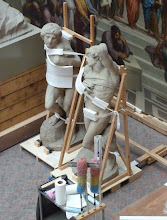Just finished reading 'The Shack'. Found it powerful and thought-provoking - in parts. Didn't agree with certain bits - but that's not the point surely (books can be at their most stimulating when you DON'T agree with them!) Certain bits were verging on the emotionally manipulative, but I couldn't - didn't want to - keep detached from its narrative hook, so inevitably shed quite a few tears at various points.
Don't like the hype surrounding this book; don't like the overly enthusiastic reviews, nor the prissy evangelical critiques of it as heretical (!), nor the slightly snotty superior reviews of it by certain blogs (mustard seed shavings may slightly fall into that category?) - the latter of which had somewhat put me off ithe book before I even started reading it.
So where does that leave me? What can/should I say about it? I'm inevitably going to fall into the category of 'slightly snotty superior reviews' I'm afraid.
Dodgey as it may be to criticise a book for what it is not, or what it omits, here are my two most abiding grumbles about it:
1. the book does not tackle the position of someone who doesn't believe in God at all (may I just clarify that, for the most part, I do believe in God - but I struggle with it) or someone whose experience of a tragedy leads them to a loss of faith - ie 'Right, well there's clearly no God (never mind a Good God) if such things happen in the world' The book engages with the problem of suffering and of evil, but its starting point is not God proving his existence to the protagonist, but rather the nature of that existence and its relationship with (and to) humanity. So basically what I'm saying is - don't give this book to an atheist and expect it to persuade them that God really does exist! (But if you're an agnostic it might help.....)
2. The question of God intervening vs not intervening (including answering our prayers in miraculous ways) leaves me with lots of hanging questions. While it gives narrative satisfaction, I am uneasy about the book's ending - almost too kind, too easy. It is a HUGE intervention, but not a life-saving one (except, one can surmise, for future victims...)
I have read criticism of the book that this one (fictional) protagonist gets more from God (in terms of Him making himself fully and palpably available) than is the experience of lots of people who have suffered even more terribly (sort of 'what makes him so special, to get this special treatment'). That's a misunderstanding of how the story should be taken, I feel - the comparision with Pilgrim's Progress is helpful - Mack is an 'everyman'. The 'faux' Forward, which understandably leads some readers to want to take the fiction as a 'true story' - and to lose faith in it when they discover it's not - is perhaps unfortunate in this regard. (The forward contains some important back-story about Mack, but in some ways I'm quite glad I skipped it and didn't go back and read it till after I'd finished the book!)
I am glad I had a quick look at the author's blog site. Makes it easier to understand how he came to write the book as it is. Anyone who puts words into God's mouth will inevitably seem to be rather bold - 'How dare he!' And by the same token, when reading it, it's perhaps a good corrective to remember that when 'God' says something in the book, you need not accept it as truly the word(s) of God. It's a human being using a device in a work of fiction. But by the same token, as some enthusiasts have claimed, the integrity of the author and the possibility that God is genuinely helping him, through this book, to reach people in an accessible form and to shake up some of our complacencies, should also be seriously considered. What is this book saying to me? What can I take from it that will help me to grow?
Subscribe to:
Post Comments (Atom)

No comments:
Post a Comment